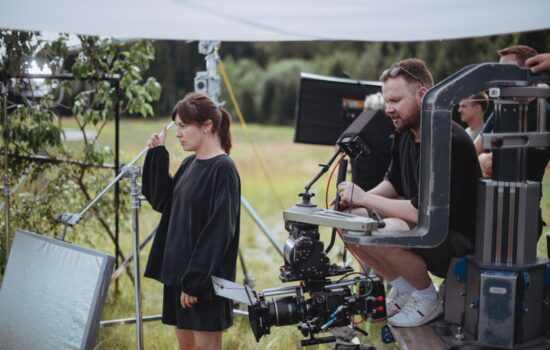Assistant Production Coordinator
Career Overview
Assistant Production Coordinators problem-solve every aspect of production. Their countless responsibilities include being the main point of contact for everyone on set, distributing scripts and schedules and taking care of on-set logistics.
Alternate Titles
Assistant Production Office Coordinator, APOC, APC
Avg. Salary
$53,3151
Salary Range
$40K – $70K1

How To Become an Assistant Production Coordinator
People also ask
Career Description
Jessie LaFave, current Assistant Production Coordinator (APC) on CBS’ Why Women Kill says APCs do “anything and everything.” She describes the core of her role as taking care of all the little things that other people forget: “It’s logistics, making sure everybody knows where they need to be and when, distributing scripts, disseminating schedules; really, we are the gatekeepers of any information anyone needs. Better still, we are the Customer Service Department of the show.”
LaFave lays out her daily routines and closest working relationships: “The APC and Production Coordinator roles are deeply intertwined; I take charge of the PAs but, to be clear, the APC is not the Production Coordinator’s assistant.
“The Production Coordinator takes the morning shift, coming in before call, and the APC does the night shift. I arrive an hour after we start filming and typically stay for an hour or two beyond wrapping to close everything out. The goal is to ensure one of us is always in the office to deal with things.”
LaFave goes on to explain that they are the front line in terms of production logistics: “We’re the ones who get the call if there’s an accident on set, or someone is hurt. Obviously, we know the production manual guidelines and protocols inside out. But if the solution isn’t in the manual, we need to find our own answers.”
During the shoot, the APC is the one everyone goes to. LaFave clarifies: “It’s about name recognition — every single show-related email that goes out has my name on it. That’s why, when people call the office, they end up asking for me. Things typically go to the APC; they then decide if it’s something they can deal with or whether it needs to be passed up.
I try to make sure that whatever comes up, even if I’m handling it, I make the Production Coordinator aware of it.
“Depending on the severity of the issue, if I can’t make the decision, I’ll liaise directly with the Production Coordinator or the Line Producer to let them make the call.” In this way, the APC deals with individuals on the show, whereas the Production Coordinator deals more closely with specific departments, handling orders and equipment.
LaFave enjoys being around set but finds herself more in the office than anywhere else as an APC these days. “I miss being out in the bullpen with the PAs because that’s the vanguard. In the office, you’re not hearing all the set secrets anymore! Being out of that has been an adjustment for me because the APC is supposed to be the person that knows everything.”
Still, LaFave deliberately makes time to be physically present outside of the office: “I think it’s really important for the APC to be on set so people can put a face to the name — people should know they can come and talk to me if something needs dealing with. Also, because the APC is not intimidatingly high up in the hierarchy, people can come and talk to us without feeling like they’re setting off alarms.”
What is an Assistant Production Coordinator?
The Assistant Production Coordinator plays a key role in making sure the lines of communication between the Producers, Executives, and other production figures are comprehensive and clear during the duration of a project.
Salary
The average annual salary for an Assistant Production Coordinator is approximately $53,300. The salary range for Assistant Production Coordinators runs from $40,000 to $70,000.
APCs are self-employed so earnings are dependent on your evolving work situation. Employment is less and less seasonal in the television industry with the proliferation of digital and non-traditional outlets, so there are more opportunities around.
That said, LaFave is keen to point out that, “There is a lot of competition for entry-level and UPC jobs, so when you do land a role, make sure you listen, ask a lot of questions and be ready to give that extra ounce. There are a lot of people who want to do it. If you do get hired, be grateful for it, be a sponge and get as much out of it as you can.”
Do Assistant Production Coordinators get paid well?
According to Glassdoor, Assistant Production Coordinators earn on average just over $40,000 per year. Keep in mind, though, that this figure can expand or contract according to multiple factors. The average salary of an Assistant Production Coordinator can change depending on their experience, the number of projects they work on in a given year, and the overall salary they receive for each project.
Hey, what do you think about trying our new Film Career HelperFilm Career Helper really quick? It’s totally free and could help get your career moving fast! Give it a try. It’s totally free and you have nothing to lose.
Career Outlook
LaFave’s answer to whether she maintains a healthy work/life balance is wry: “I try.” She clarifies: “It depends on the hours I’m working. I try to work out in the morning if the crew call is late enough. But I work over twelve hours a day and there’s always something going on: there’s prep happening for the next episode, people in the office, problems to solve.
“On this show, we shoot nights every Thursday and Friday which means 3 a.m. finishes on Saturday mornings. It’s hard to find balance.”
However, LaFave insists she is getting better and she has some wise words for anyone stepping into an APC job: “I always tell people, and this includes PAs: for my first two years, I didn’t take any time off. I missed birthdays, weddings, funerals. But I’ve learned in the past couple of years that when I want to take time off, I take it.
“If I want to plan a vacation, I do and I tell anyone who wants to hire me that I need that time off. If you’re not taking care of yourself and your wellbeing, the job becomes that much harder; you must value your time and do the things you love.
“The world won’t end if you miss a week of work, but you will regret missing the big events and you won’t remember why you missed them. Doing the things you enjoy makes you happier in your job.”
Career Path
LaFave moved to LA when she was eighteen and started taking classes at a community college with the view to transferring to one of the bigger schools such as USC or UCLA. Then, she had an epiphany: “I realized it wasn’t for me — I just wanted to get on with it. I didn’t want to read books on making films, I wanted to go out and do it.
“So I reached out on Facebook to see if anyone was willing to give me information on how to get a job or get my foot in the door. My aunt connected me with one of her friend’s daughters who was a Writer at Comedy Central so [it] was a circuitous connection, but I met with her and she sent my information to her old boss.
“They brought me in to freelance PA on some small, digital projects. While there, I worked myself to the bone, asked a ton of questions and, in the end, no one told me to stop coming in!”
After a number of PA positions in different departments, LaFave ended up producing a digital project for Viacom and carrying the project through post-production. “I wasn’t saying no to anything,” she explains. “I figured how to do it as I went along. After that, I really wanted to move into TV so I took a bit of a step-down and became an Office PA for two months on a show.
“That rolled into another production where the APC stepped away and I took on that role. It’s true that I moved up a little more quickly than is typical, but it was because of my studio experience beforehand. That was really valuable.”
As for her future, LaFave is crystal clear on where she wants to be beyond her APC role: “I want to be in charge on the day. I want to weigh in on the big decisions and have the authority to hire representative department heads: women, people of color, LGBTQ people. I want to build a collaborative experience for people; that’s my vision, to create an environment so people enjoy coming to work. That changes people’s lives.”
In the shorter term, LaFave is eyeing a move to Production Coordinator.
Given that there is no formal educational route to the Production Office, LaFave reminds us that any job involving discipline or problem-solving on the spot will really help.
She continues: “Another huge asset is being able to listen, to sit back and process what people are telling you. Most people just come into our office and start spurting out information at us. We have to have our ears open at all times and be ready.
“I’m always listening to what people are saying on set, to know what’s going on in my environment. Us APCs have to have our fingers on the pulse and I’m a real believer that it’s better to have (and to give) too much information. No one ever died of being too informed!”
So, for anybody keen on breaking into the Production Office, experience in a problem-solving, dynamic environment will come in very handy. This includes retail, hospitality and military jobs — it’s all useful when it comes to on-set production.
- “Reach out to people in the business and talk to them. The advice I always give people is to stay in touch with anyone you have coffee with, or who sits down with you to offer advice. People leave those meetings and have their own careers to think about — you have to try and stay in the forefront of their minds, make yourself a thought. It’s good to follow up every couple of months with updates. You have to hone in on your connections and stay in touch with anyone who might be able to help.
- Do your research by learning the key positions on set.
- Try and get a PA job on set or in an office, or in reality television or even in short films or student films. Any experience you can get is going to be very valuable.”
What is the role of Assistant Production Coordinator?
An Assistant Production Coordinator typically boards a project during pre-production and remains with a project possibly even through post-production. In addition to their role as the go-between for the Producers and Studio Reps, the Assistant Production Coordinator also spends a great amount of time keeping the production office smoothly run and organized. They may also be responsible for distributing the daily shooting schedules and script revisions.
Experience & Skills
There are certain skills that you can be working on before you hunt for a PA or an APC role — LaFave recommends getting up to speed with what exactly people do on set (something you can do readily here on CareersInFilm.com!):
“The knowledge of key positions is really important. Anyone who wants to do this job should make sure they’ve been an Office PA first. That’s what I did and it allows you to learn the ins and outs. I asked so many questions all day because I wanted to learn how to do things. You learn this job as you go.”
LaFave suggests that basic computer skills are important too, but she laments the challenges breaking into the industry: “I wish there was a better way to teach people this job, but working in the business and mastering skills as you go is the only route. I’m still learning every single day!”
In terms of looking for practical experiences for anyone breaking in, LaFave has some advice: “Freelancing is daunting — a job ends and then you have no income, what do you do? That’s why I always tell people to get in on the physical production side at a studio and learn why their production manuals and systems are the way they are. Then you’re overseeing the production of multiple shows at once and it’s extremely comprehensive experience.”
Organization is key to any APC job, and LaFave has it in spades: “I fell in love with production because I’m super-organized. I’m detail-oriented and a strong communicator; those are my assets and the production world recognized it even before I did. Honestly, I’m strange; I love Excel spreadsheets!”
Beyond a passion for spreadsheets, a fundamental love of production will stand anyone in good stead. Says LaFave, “Anyone who is eager, anyone who goes the extra mile and makes that extra effort, they are the ones who do well. You always have to try to be a few steps ahead of everything that is going on.”
Education & Training
LaFave revels in the variety of APC work, explaining that there is no formal training for a coordinating job: “Every day there’s a new problem, something comes up that I’ve never dealt with before. And we get into it.
“I ask a lot of questions because you want to know how to do everything — there’s no proper training for this because it’s really about problem-solving while on the job. There are no instructions, the manuals can only help so much. You develop confidence because you’ll have dealt with something similar before, or you’ll know who to go to for guidance.”
In terms of training for the entry-level PA position in production, there is a PA Bootcamp in LA, but LaFave fears it is too set-based and therefore limited in its utility: “I’m an advocate of ‘learning by doing’ instead of someone telling you how to do it.
“You learn how to manage the stress, how not to panic if something is not quite right. That takes time, experience and confidence-building. APCs have a mantra: every problem is solvable. In production, we never say no — there is always a way!”
LaFave also suggests keeping an eye on the website of her union, the IATSE Local 871: “They are starting to do courses. You need to check if it’s open to the public yet or when they’ll become available.”
Additional Resources
The union representing APCs is the IATSE Local 871. LaFave describes the union complexities for APCs and Production Coordinators: “In terms of our job progression, once we become Production Coordinators, things get complicated. A lot of people go on to become Production Supervisors, but to step up to Unit Production Manager (UPM), you have to join the Directors’ Guild (DGA) and they have no interest in letting you in if you’re not an Assistant Director (AD) or a Production Accountant/Assistant Production Accountant.
“It’s a weird block in the union and logically, it doesn’t make sense. Production Coordinators execute many of the UPM tasks so it’s strange that the DGA puts up roadblocks at that point. I know execs and people higher up are trying to change it and find a solution. Why the UPM is a DGA job is something I will never understand; it’s very frustrating and we end up being notoriously undervalued. We really should be covered by the Producers’ Guild (PGA).”
FAQ
What is the single biggest suggestion you would give to someone wanting to get into this career?
“These jobs are not online on indeed.com — they are word-of-mouth gigs because we want reputable people who have been vouched for, even if they have no experience. I have interviewed people who might not be right for my current team dynamic, but I’ll recommend them to another department and they end up working for them instead. That’s how I’ve got my jobs over the years.
“I do suggest contacting APCs directly. I’ve had people reach out to me via LinkedIn or Twitter or Facebook asking me how they might get involved. I am very receptive to that kind of contact; I want people to go the extra mile and have the courage to reach out. If people want it, they should make the extra effort. Not every APC is like that, but I am!
“In fact, following this interview, I have set up an email specifically for people looking for advice or guidance and you are more than welcome to get in touch with me here: [email protected]. I look forward to hearing from you!”
What’s the #1 mistake people make when trying to get into this career?
“Disingenuousness. I can tell when people are trying to tell me what they think I want to hear. Be candid and honest about you want from your journey. If you tell people honestly and passionately what you want to do, they can help you.”
If you could describe in one word what makes you successful, what would it be?
“Eagerness.”
Sources

Jessie LaFave
Jessie LaFave was born in San Diego, CA, but raised in Jacksonville, FL. She moved to Los Angeles when she was 18 years old with a passion to pursue a career in Television & Film. After spending a year in community college classes and working a retail job, an opportunity finally presented itself. She started out assisting the SVP of Digital Production at Comedy Central and it didn’t take long to figure out that she had found her path in this industry.
Physical production was a natural course of action that inspired her to learn and grow, with the hopes of eventually moving up the ladder to produce projects of her own choosing. After a year in the digital world at Comedy Central, she made the transition to scripted television. Since becoming an Assistant Coordinator in 2016, she has worked on NBC’s Great News, Facebook’s Sorry For Your Loss, and most recently Why Women Kill for CBS All Access.
References
- 1Multiple. "Assistant Production Coordinator Salaries in United States". Glassdoor.com. published: Aug 1, 2018. retrieved on: Dec 11, 2019



















